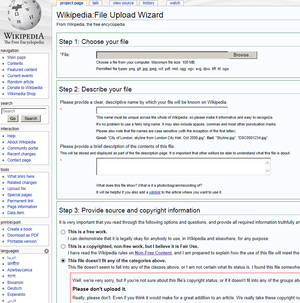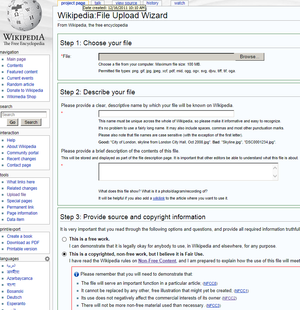Internal:Public Policy/Orphan works
Status: Draft
- This is a draft of the Public Policy Committee's report to the Board of Directors on the subject of Orphan Works and Mass Digitization for the U. S. Copyright Office workshop on March 10–11, 2014.
Draft
Talking points
- Explain what the Wikimedia projects are and how we make use of public-domain and freely licensed text and media.
- See background prose below. The copyright office community is unlikely to know anything at all about us except what they've read in passing in the newspapers.
- Emphasize the point that very few works first published after 1922 are in the public domain, while those that are are usually due to technicalities that are often are hard to verify. This puts most media from the twentieth century out of our reach, making it harder to pursue our educational mission.
- State that we want any reform to avoid undue burdens on our uploaders and the Wikimedia Foundation.
- We want the procedure to be simple enough that our uploaders can follow it easily by following a checklist on a web form (see examples at right). This includes the full spectrum of Internet users, which includes people of all ages and language abilities. Wikimedia tries to be systematically careful about copyright, and we need to make it easy for our volunteers.
- We want to avoid anyone having to pay an self-defense fee in escrow.
- We like the idea of extra limitations on remedies for not-for-profit uses: there is a list of institutions that have a low low cap or zero on how much they'd owe for infringement. We would like Wikimedia projects to be part of that list.
- Give specific examples.
- Some possibilities are below.
Background on Wikimedia and its uses of works
The Wikimedia community is dedicated to creating "a world in which every single human being can freely share in the sum of all knowledge" through its educational projects such as Wikipedia, Wikimedia Commons, and Wikisource. Wikipedia is the fifth most visited website on the Internet, and the largest reference work ever assembled, with 20 million articles over 285 language editions. Wikimedia Commons is a media file repository making available public domain and freely-licensed educational media content, currently containing over 20 million images, sound, and video clips. Wikisource is an online digital library of free content textual sources; English Wikisource alone has over 300,000 texts. As Wikipedia's content is available under a free content license, it is freely available to be seen and used by anyone in the world. We emphasize that the content in these projects is created and maintained not by paid archivists, but by volunteers from around the world and from all walks of life who contribute by editing and uploading files to our wikis on the Internet.
Wikimedia projects have long used public domain and freely licensed works to support our educational mission. These uses include using text and visual media as part of encyclopedia articles, and making them available for reuse by others. However, very few works first published after 1922 are in the public domain, while those that are are usually due to technicalities that are often are hard to verify. Wikimedia projects also use user-provided content granted under a free license such as Creative Commons or GFDL, but these are almost all of very recent vintage. There is this a very large gap where there are very few items that are available for use in Wikimedia's projects, a situation that is a serious setback for our educational mission.
We would very much benefit from legislation that would allow us to use orphan works is a way that imposes a minimal burden on our many volunteers. Simple and clear guidelines for what threshold must be met for a diligent search would reduce uncertainty about when orphan works can be uploaded. Imposing extra technicalities such as requiring users of orphan works to register or pay an escrow fee would make it difficult or impossible for Wikimedia projects to host these works. Limiting monetary liability for non-profit publishers of orphan works would likely be a necessary provision, and it would be important that wiki-based projects like the Wikimedia Foundation be included in the list of exempted organizations along with libraries, archives, and museums.
Examples
Wikimedia projects cannot currently use orphan works; how they would benefit from being able to use them to fulfill our educational mission. What are examples where we struggle with orphan-works copyrights?
The issue will be clear if we have examples to work from.
- Wikimedia DC's upcoming photo hunt in the South. Individually created photos will be under a free license, but buildings that no longer exist or had a different appearance need historical photos. We're seeking to partner with local archives and historical societies, but their photos often have no metadata. Without author and publication data, we have no way to determine if they are in the public domain and thus can't use them. Orphan works reform would however allow us to use these historical works to illustrate articles, and make them available for wider reuse by others.
- Family photos are one case I experienced. I struggled with the decision about whether to use a photo of economist Bert Hoselitz that came from his family to illustrate the article about him. It wasn't clear what to do and I gave up, to the disappointment of people who had helped me. The original photographer could not be identified. Who held the copyright? How would I label it on Commons? I didn't want to end up in an argument. I'd already had to fight pretty hard to kill off a photo of someone else that was incorrectly labeled as a photo of Hoselitz. The photo was also quite dark--a side issue. To the point: if orphan works were a nicely available permission category on Commons, that would have helped me. -- Econterms (talk)
- one member is often paralyzed with fear regarding materials since 1923 which might be under copyright, and and retreats to the safe harbor of post-copyright materials before 1923
- ambiguity about US government works which might have been produced by contractors not employees, e.g. those of national labs. photo of scientist example.
- One of our members reports a chilling effect on writing on topics that requires sources written after 1923, due to the incomprehensible copyright laws. She would really like to write new articles about topics that are more modern than clipper ships and defunct Tibetan monasteries, and is eagerly awaiting reforms in the law
Definitions
Source for most of these: 2006 copyright office Report on Orphan Works
- orphan works -- These are works whose copyright owners cannot be identified or cannot be located, and therefore permission cannot be obtained from them for using the works. (The category may also include works for which it is not known whether a copyright currently applies, but I'm not seeing sources say that.)
- registry -- in this context, this would be a database where works and their copyright ownership are listed and searchable.
- 1976 Copyright Act -- this U.S. law removed the requirement that a work be registered with the Copyright Office, and switched to the mode that a copyright applies as soon as a work is "faxed in a tangible medium of expression." The previous law was the 1909 Act. This is a simplification.
- Berne Convention -- this treaty on copyrights forbids national laws from imposing the requirement that creators of works would have to register them explicitly, or renew them, or give certain kinds of notice to users.
- (reasonably) diligent search -- a likely requirement of a law permitting the use of orphan works is that the user has tried to search for the copyright owner, and the law introduces less friction to the extent if makes a clear explicit feasible to-do list for that user to satisfy the search requirement. So one "diligent search" requirement might be that the user has conducted certain queries to specific registries to see if the works were listed there.
- no response case -- suppose a copyright owner is identified but does not respond to requests by potential users of the work. The Copyright Office report recommends against calling this an "orphan works" case, because the copyright owner is not obliged to respond. However this is in the class of marginal cases that commentators of the orphan-works cases sometimes mention or make recommendations about.
Sources
- The Federal Register notice says we have till April 14 to submit a statement
- http://www.ala.org/offices/sites/ala.org.offices/files/content/wo/reference/colresolutions/PDFs/012407-CD20.1.pdf
- http://www.ala.org/advocacy/copyright/orphan
- http://www.librarycopyrightalliance.org/submissions/domestic/orphan.shtml
- Society of American Archivists' best practices guidance on orphan works
- The workshop page
- Report on Orphan Works by the US Copyright Office, 2006 (Notes on 2006 report)
- A 2011 background paper on mass digitization by the Copyright Office, especially see pp. 25ff
- This page's talk page
- Discussion at Wikipedia Village Pump
- WMDE Statement on Orphan Works, Berlin, August 10, 2012 ; (Notes on /Notes#Wikimedia Deutschland statement on orphan works)

